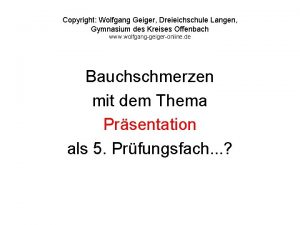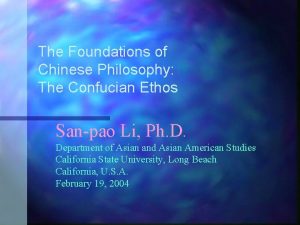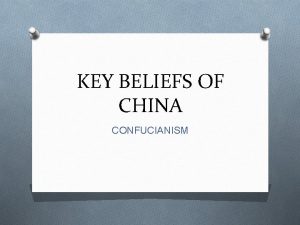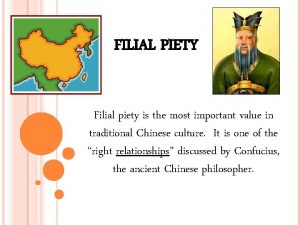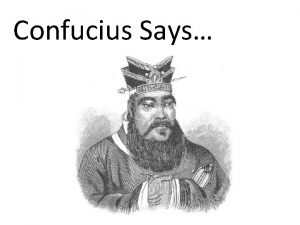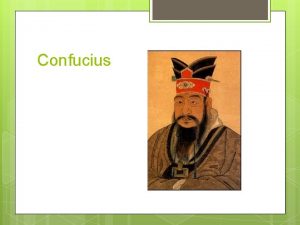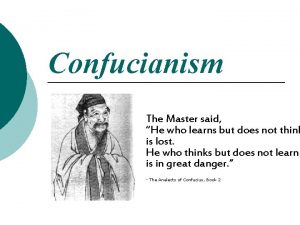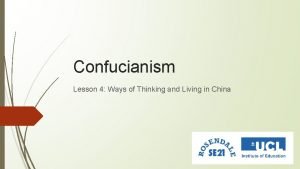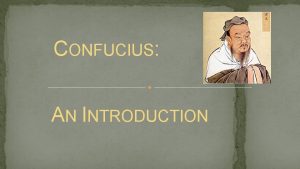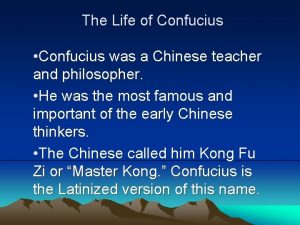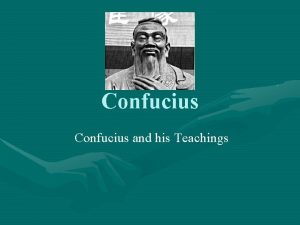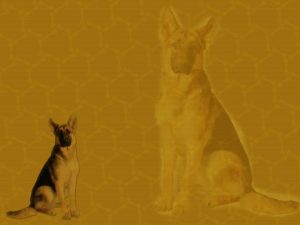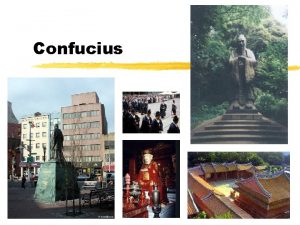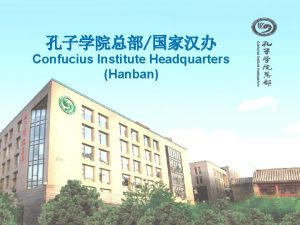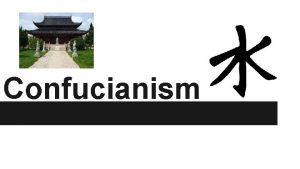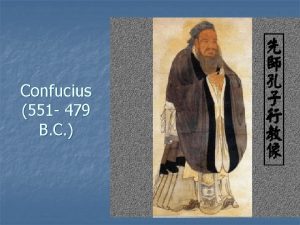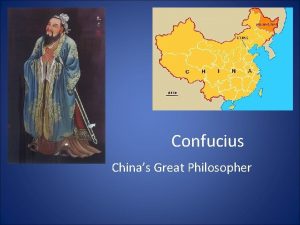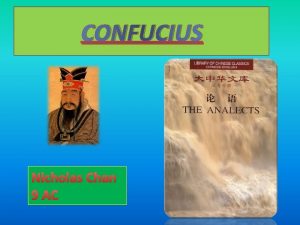Confucius Wendy Langen Chinese History Chinese history is

















- Slides: 17

Confucius Wendy Langen

Chinese History • Chinese history is a story of dynasties which exert centralized control over large areas. After a time of Warring States 476 -221 BC, China was consolidated in the brief Ch’in period. • Following the Ch’in is the Imperial period beginning with the Han dynasty • China is vast, essentially isolated and self-sufficient.

From 6 th grade social studies

Confucius was born in a chaotic time before the Warring States period, and was influenced by the preceding peaceful period of the Chou. From history of the words public works

Dates of Chinese dynasties are given, but changes occurred over longer time. • 1050 -220 BC mostly peaceful Chou period inspired Confucius • 772 -481 Spring and Autumn Annals written by Confucius idealizes these years of stability, order, and peace • 551 Confucius was born • His father was an official in the Sung area, but was forced to move to Lu after an assassination. This likely affected Confucius’ life and influenced his thought.

Ch’in, then Han • Briefly from 220 to 207 BC the Ch’in consolidated what we consider China (gave it the name China) and ruled with force, assisted by new long sword technology. • Ch’in adopted a legalistic ideology, in which Rulers rule by force, discipline, and censorship of possibly subversive thought. • The Han followed and based their rule on Confucius ideology -Tradition, hierarchy, responsible and loyal administration. • Han period 206 BC to 208 AD was peaceful and conducive to much innovation and technological advances.

Confucius life • Confucius was born in 551 BC after his family had to move for reasons of political unrest • He was given a traditional education which included literature, poetry, music and rituals. • He founded a school, traveled for 10 years, then returned to Lu to found more schools for government administrators. • His thought permeates Asian culture and tradition.

• Dates of his birth, travels, and schools are known • Many of his books are attributed to his disciples, some he was known to have edited • This portrait is was made over 700 years after his death

Confucius thought • Benevolence can be taught, and should be taught to government officials • “do not impose on others what yourself do not desire” • Li is a guiding principle and the ritual showing respect and devotion to ancestors, and rulers. It extends filial responsibilities of care and loyalty to governor/ citizen relationships. • Hierarchy is important for centralized rule of vast, populous China.

Confucius Education • Confucius schools are based on his texts: • Five Classics and • Four Books included Spring and Autumn Annals which chronicled the peaceful Chou period, idolizing an Emperor's younger brother who served as regent to his nephew, the new young Emperor. • Courses culminate in exams which earn students degrees of Bachelor or Master for places in government hierarchy.

Confucius taught to follow the Way- Tao. Lao Tzu was a contemporary who founded Taoism, which is distinct from Confucius thought in several ways. Confucianism Taoism • Way as guide to conduct • Ritual to reinforce loyalty and civic responsibilities • Way as personal path or purpose • Self-reflection to reveal individual’s path

Discussion • Confucius was born and created his philosophy for responsible government during a period of social unrest • The Ch’in consolidated China under a legalist governing philosophy and destroyed many of his writings ~220 BC. The Qin had a legalist mindset and a long iron sword. • The Han dynasty resurrected his teachings ~206 BC to 220 AD, and trained its administrators in his model. • What would China and the world be like if none of the Confucius’ writings and philosophy had survived that brief Qin period?

Discussion • Lao-Tzu was a contemporary of Confucius. He authored the philosophy of Taoism-There is a unifying force and a way for each individual. One should not try to exert force on others, but reflect to find one’s own true path. • The Ch’in adopted legalism instead of Taoism and Confucius thought. The dynasty was short-lived. The Han adopted the Confucian philosophy. • What would you choose if your intent were to consolidate and centralize power over a vast distance and many subjects?

Discussion • Confucius curriculum included poetry and music, for a liberal arts breadth. • “Bachelor’s” degrees could be earned at local schools, then • “Master’s” degrees at the provincial level. • Finally, competitive students could take the shih essay tests to become high ranking officials of government. • How does this compare with our own education system?

Discussion • Anthropologist Martin Shoenhals has observed Chinese middle classrooms’ teachers use of rankings to motivate students. • How can rankings based on performance or “merit” motivate students? • Is this method always constructive?

Discussion • Many of the Li ceremonies taught by Confucius were established during the Chou period as ways of honoring elders, rulers, and ancestors. • Do we have similar ceremonies to honor groups in Western culture?

Golden Rules A golden rule for Golden Rulers • “Do not impose on others what yourself do not desire” • “Do unto others as you would have done unto you” • How do these rules differ? • How are they the same?
 Langen foundation
Langen foundation Ludwig-erk-schule langen
Ludwig-erk-schule langen Steckleiterteil
Steckleiterteil Wohnbaugenossenschaft murifeld
Wohnbaugenossenschaft murifeld Dreieichschule
Dreieichschule Anglo chinese school chinese name
Anglo chinese school chinese name Confucius values
Confucius values Timeline of confucius
Timeline of confucius Confucianism beliefs
Confucianism beliefs Marco polo accomplishments
Marco polo accomplishments Confucius institute at moscow state linguistic university
Confucius institute at moscow state linguistic university Confucianism beliefs
Confucianism beliefs Ancient china confucius
Ancient china confucius Confucius says
Confucius says Where did confucianism begin
Where did confucianism begin It means goodwill politeness and generosity
It means goodwill politeness and generosity Confucianism teachings
Confucianism teachings Confucianism philosophy
Confucianism philosophy




